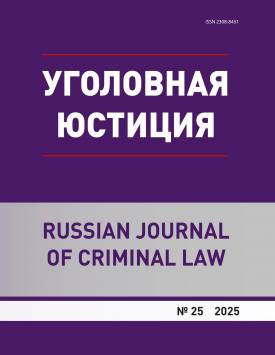Typology of offender personality based on foundational socio-psychological attitudes
Current methods of defining criminal personality typically rely on characteristics observed in incarcerated individuals. However, a more effective approach would focus on distinctive traits common to all offenders, selecting those that enable systematic identification of perpetrators for specific crimes, optimal corrective interventions, and root-cause analysis of antisocial behavior formation. This study aims to establish a personality framework for assessing antisocial (deviant) tendencies and develop a corresponding offender personality typology. The methodology integrates general scientific methods (analysis, synthesis), specialized legal approaches (formal-logical, comparative legal, systemic-structural); psychological techniques (observation, biographical analysis). Key assessed personality dimensions include aggression expression patterns, cognitive ability levels, emotional/psychological stability, behavioral intentionality, societal norm recognition. The foundational socio-psychological attitude was identified as the most legally relevant criterion for determining deviant propensities. The resultant typology classifies offenders into five types: instinctive egocentric, selective egocentric, group-influenced egocentric, coerced empathetic, despair-driven empathetic. The author declares no conflicts of interests.
Keywords
criminal personality, hidden aggression, formation of criminal personality, punishment for crime, exposure of a guilty part, offender personality types, crime victim, empathetic offender type, egocentric offender type, liability for negligent upbringingAuthors
| Name | Organization | |
| Trofimova Galina A. | Research Association "Legal Initiative" | Trofimova_Galy@mail.ru |
References

Typology of offender personality based on foundational socio-psychological attitudes | Ugolovnaya yustitsiya – Russian Journal of Criminal Law. 2025. № 25. DOI: 10.17223/23088451/25/18
